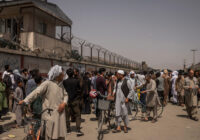Afghanistan is at a critical stage in its decades-long conflict. A combination of factors has led to a deterioration of the country’s security. These include political corruption, dysfunctional institutions, patron-clientelism and social instability. Violence has intensified in recent years, causing numerous causalities of civilians and troops.
Can the Taliban and the Afghan Government Make Peace?
Washington has been a key supporter of the Afghan political system ever since the Taliban regime was overthrown in 2001, when NATO invaded Afghanistan after the 9/11 attacks in the US. Since then, the US has sought to strike a deal with the Taliban, who have led an insurgency against NATO and Afghan security forces.
Making Peace
The US-Taliban peace deal — which the Afghan government is not a party to — was struck on February 29. If successful, it could help bring an end to the longest war in US history. The deal, which was signed in Doha after mediation by the Qataris, was the result of months of talks between Taliban officials and Zalmay Khalilzad, the US special envoy to Afghanistan. The agreement aims to pave the way for the end of US military involvement in Afghanistan and the withdrawal of foreign forces from the country if the Taliban uphold their side of the deal.
The accord has been met with opposition due to continued attacks by Taliban militants against Afghan forces and civilians. On March 10, the Taliban and the government in Kabul were due to enter intra-Afghan peace talks for a separate agreement. However, an attack on a hospital maternity ward in May, which caused the death of mothers, midwives and newborns, threw the idea of peace in Afghanistan up in the air. As a result, the government resumed offensive operations against Taliban militants soon after the attacks. Afghan officials have since confirmed that peace talks are set to begin in September.
“This is cradle-to-grave terrorism,” says columnist Max Boot in an op-ed for The Washington Post, referring to the attack on the hospital. Nonetheless, US officials, including President Donald Trump, have stressed their desire for Afghans to take charge of their own security rather than relying on US and NATO forces. The US insists on intra-Afghan negotiations and is in a hurry for there to be a political settlement between the government and the Taliban.
Based on its continued stance, there is no doubt that the Trump administration is committed to the Doha deal and its withdrawal of troops from Afghanistan, whatever the circumstances or consequences. This makes it more unclear what the US-Taliban agreement could lead to and, more importantly, how much influence the Taliban would have on Afghan politics and society as a result.
Ending Decades of Conflict in Afghanistan
Ever since the Soviet invasion in 1979, Afghans have witnessed violence. Many young people are fed up with warlords who have destroyed the country and profited from its misery. Yet there is optimism that a political solution will emerge from the Doha agreement. This could have a lasting and positive impact if certain conditions are addressed.
In this context, a number of local, regional and global factors are crucially significant to bring an end to the longstanding conflict and ensure a durable political settlement in Afghanistan.
First, Afghans need to work on a local and national consensus. In a divided and diverse country like Afghanistan, the people must build strong social networks that include all factions and ethnic groups. They must work on a general consensus pertaining to a power-sharing structure.
That said, the power distribution should be based on citizenship, not ethnic and religious lines. In the long term, stability and development are likely to be ensured if power-sharing is based on Afghan citizenship. Aside from this, the government needs to support such community networks, strengthen key institutions, continue to empower Afghan security forces and clamp down on widespread corruption.
Second, under the auspices of the United Nations, a shura (council) should be created that consists of all sociopolitical elites, including political, tribal and community leaders, to lead the Afghan peace process. This shura needs to negotiate a ceasefire as a first step. Holding direct talks between rival groups is the second step. This would involve the government, the Taliban and former mujahideen commanders.
To carry out the talks, the shura needs to form an inclusive and consultative negotiating team from all ethnic and political groups to be able to address the deeper grievances in the country. These issues should be aired by the people and addressed under Afghan legal frameworks and the rule of law.
The shura needs to help all opposition groups resolve their differences and conflicts through dialogue. For a peace agreement to succeed, the Afghan government, the Taliban, all Afghan leaders, ambassadors of regional states, representatives of major Muslim countries and members of NATO must be a party to the deal. These stakeholders would need to guarantee that they would abide by any conditions in the settlement, and regional states would have to agree to end all meddling in Afghan affairs.
Third, there is a need for economic and political pressure at a regional level. Considerable pressure should be imposed on influential states like Pakistan and Iran. These two countries are considered to be the root of the problem in Afghanistan and have been accused of harboring and supporting insurgents. Hence, it is necessary that Islamabad and Tehran assure the Afghan government that they will not provide safe havens for terrorists and that anyone doing so will be brought to justice.
It is also vital that Pakistan and Iran own up to their covert interventions in Afghanistan’s internal affairs. Both of these nations should be transparent about such operations with the Afghan government and external stakeholders. Furthermore, regional states must recognize the political independence, territorial integrity and the rights of Afghan people to self-determination in their choice of political system.
The assurances and regional consensus also need to be based on a commitment by the Afghans. In other words, in order to ensure an end to meddling in Afghan affairs, the government in Kabul must remain impartial when it comes to the political situation of other regional states.
In addition, Kabul needs to assure regional states — Iran and Pakistan, particular — that their legitimate interests in Afghanistan will not be harmed. The Afghans must pledge to be active partners in trade, transit and energy resources. This would be a gamechanger for the region. There would be a shift away from the destructive intervention of neighboring states toward regional connectivity and an economy-focused approach that would benefit all nearby nations.
Fourth, once a peace deal is reached, the international community could transform a treaty into a sustainable settlement through political and economic assistance. With this in mind, once a peace agreement is ratified, Kabul should engage with the US, the European Union, the World Bank and other international partners to design and implement nuanced development programs that could lead Afghanistan toward greater physical and economic stability. This would create job opportunities for all civilians and even militants, who would, presumably, put down their guns.
In the first phase after a peace deal is enforced, a clear future plan needs to be implemented so members of opposition groups can be appointed in official positions. In this regard, the rights and obligations of the political forces of militant groups would be on the same footing as other Afghan citizens in a democratic and fair manner. The aim would be to reintegrate opposition groups and to encourage dialogue to prevent future conflict. Furthermore, the international community, alongside the shura, should persuade all parties — including the Taliban’s political wing — to participate in free and fair elections.
If Peace Isn’t Possible?
These measures would strengthen and consolidate the peace process to ensure that weapons are put down and stay down. A failure to address these conditions could lead to an intensified proxy war. As a result, non-state actors like the Taliban would step up with their insurgency, leading to an escalation of violence. This would not only bury any possible political settlement, but it would also derail global security.
The views expressed in this article are the author’s own and do not necessarily reflect Fair Observer’s editorial policy.
Support Fair Observer
We rely on your support for our independence, diversity and quality.
For more than 10 years, Fair Observer has been free, fair and independent. No billionaire owns us, no advertisers control us. We are a reader-supported nonprofit. Unlike many other publications, we keep our content free for readers regardless of where they live or whether they can afford to pay. We have no paywalls and no ads.
In the post-truth era of fake news, echo chambers and filter bubbles, we publish a plurality of perspectives from around the world. Anyone can publish with us, but everyone goes through a rigorous editorial process. So, you get fact-checked, well-reasoned content instead of noise.
We publish 2,500+ voices from 90+ countries. We also conduct education and training programs
on subjects ranging from digital media and journalism to writing and critical thinking. This
doesn’t come cheap. Servers, editors, trainers and web developers cost
money.
Please consider supporting us on a regular basis as a recurring donor or a
sustaining member.
Will you support FO’s journalism?
We rely on your support for our independence, diversity and quality.






